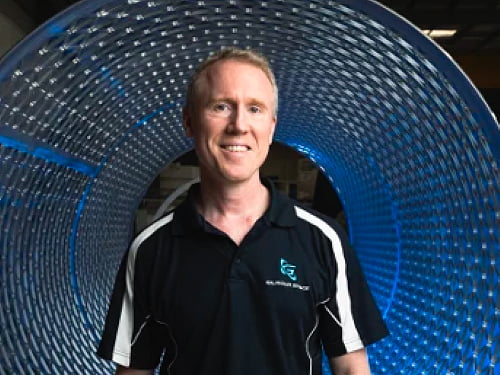Debates about the notional definition of sovereign capability has entered mainstream policy debates over the past two years.
The impact that Covid and the economic crisis that it wrought has had on supply chains highlights the importance of maintaining a sovereign capability in key strategic areas. There is a clear need to manufacture crucial products in this country to be self-reliant.
Building economic resilience through investment in sovereign capability has become a key focus of the Albanese Labor government and is an important element of the National Reconstruction Fund, which was passed by Parliament this week.
But Gilmour Space Technologies founder and chief executive Adam Gilmour says Australia’s approach to sovereign capability must not be confused with domestic capability.
It is not enough that products of strategic significance are made in Australia by offshore interests. There must be a focus on not just building products, but doing it through companies headquartered in Australia and controlled by Australians.
In this episode of the Commercial Disco podcast, Mr Gilmour discusses the importance of using Australian companies in the supply chain, how the National Reconstruction Fund can support dual use technologies, and the journey towards the company’s pivotal first launch.
“Our government has started off with the concept of sovereignty as being made in Australia, and that’s better than not being made in Australia,” Mr Gilmour told the Commercial Disco podcast.
“But if it’s still made in Australia by a foreign company, in a crisis situation, there’s nothing stopping that company from saying, ‘okay, I’m going to make my widgets here, but I’m sending them to my home country, because my home country has ordered me to do that’.”
“That’s where we’ve got to move to. We’ve got to have as many things as we can … built in Australia by Australian companies.”
Gilmour Space Technologies is readying to launch its first rocket from the Bowen Orbital Spaceport in Queensland later this year. Mr Gilmour said he has faced funding difficulties from the federal government.

“We’re going for our first orbital launch this year, and I’ve only had a million dollars of support from the Australian Space Agency – and that’s crazy,” he said. “I’ve had more money out of Defence.”
Mr Gilmour said that dual-use technologies, encompassing most space technologies, often face a “chicken or the egg” funding situation which can see them fall between the gaps, and this is something that the new $15 billion National Reconstruction Fund needs to avoid.
“A lot of people think that we can farm well, or we can mine well, but that’s all we can do, and everything else we have to get from overseas,” Mr Gilmour said.
“I think that’s part of the problem in Australia. There’s almost a philosophy of waiting until something has succeeded before they support it. And in something as complicated as a rocket, it’s just almost an impossibility to get there. If we didn’t have venture capital, we never would have made it.”
Gilmour Space Technologies has made an active effort to support Australia’s sovereign capability in space through its upcoming launch. If successful, this launch will help 300 Australian companies to get base qualifications.
“We really have tried to use as many Australian companies as much as we can. And the way we’ve done that is we’ve looked at companies that make something that looks like a rocket,” he said.
“And then we say to them, ‘do you reckon you could make this? And they say, ‘we’ll give it a try’. We’re not buying off the shelf stuff that’s already gone into space.”
While still waiting for launch site approval and launch approval, Gilmour is currently integrating the hybrid rocket motors onto the first stage, and preparing for a full wet dress rehearsal, with hopes of a full launch by September.
“There’s a lot of people talking about nuclear submarines as being super, super complicated, and that only seven nations in the world make nuclear submarines,” Mr Gilmour said.
“Well, only 10 nations in the world make orbital launch vehicles. So in terms of complexity it’s right up the top of something really, really hard to do.”
Do you know more? Contact James Riley via Email.
